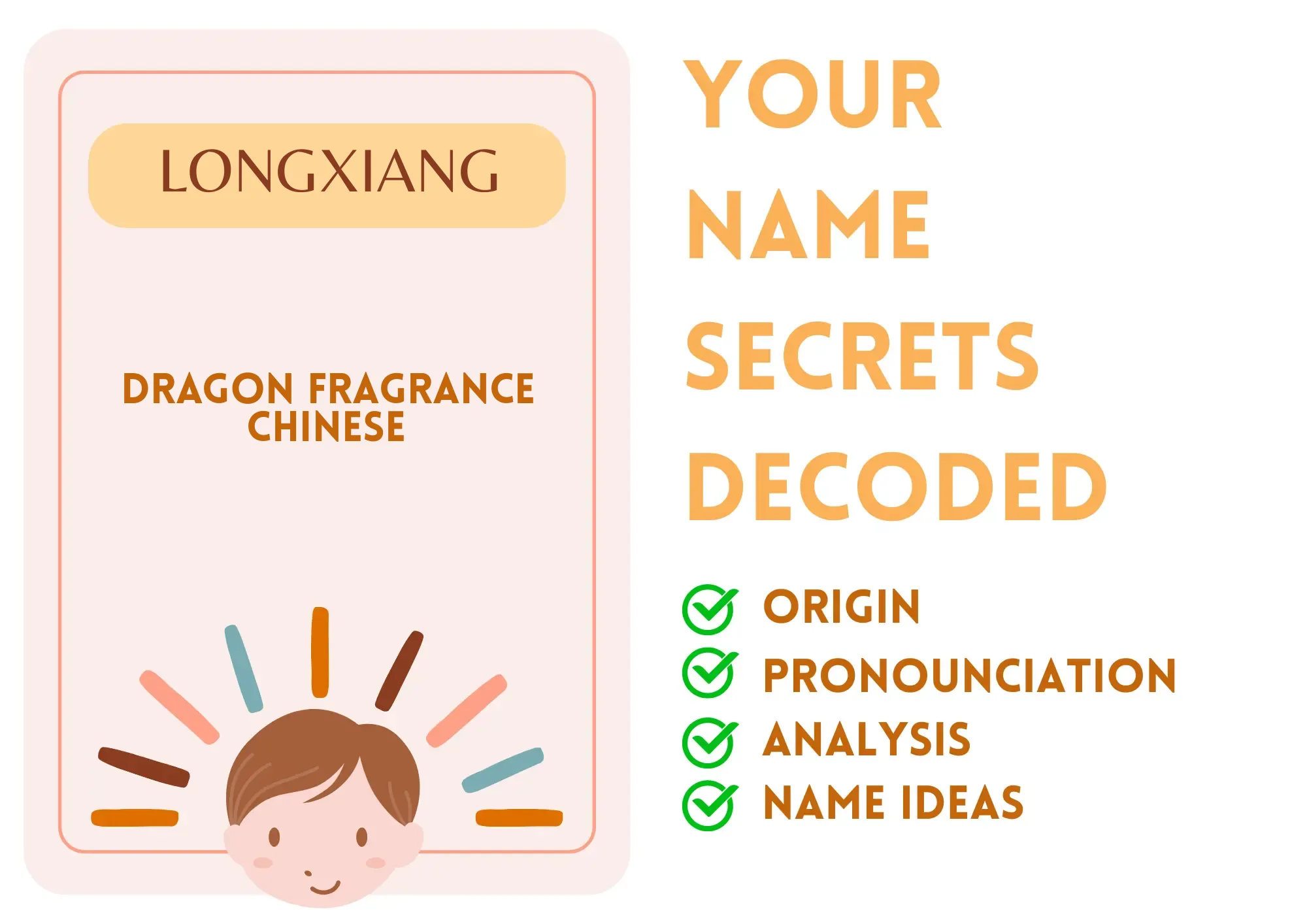
Longxiang
Longxiang is a unique and meaningful name of Chinese origin, translating to 'dragon fragrance' or 'fragrance of the dragon.' Typically used in Chinese-speaking communities, it is predominantly male. In Chinese culture, dragons symbolize strength, power, and auspiciousness, making the name significant.
The name is often viewed positively, reflecting qualities of majesty and favor. Longxiang rolls off the tongue quite easily and has a melodic sound. Commonly used nicknames include 'Xiang' or 'Long.'
In folklore and literature, dragons are celebrated creatures in Chinese mythology, often featured as revered figures in stories and poems, infusing the name with historical depth and cultural richness. Longxiang represents both the essence of strength and a connection to cultural heritage, making it a distinguished choice for parents.
Basic Information
Gender: Boy
Sounds Like: Lohng-shee-ahng
Pronunciation Explanation: The first syllable 'Long' rhymes with 'song,' the second syllable 'xiang' is pronounced like 'shee-ahng,' with a slight emphasis on 'shee.'
Summary and Meaning
Meaning: dragon fragrance (Chinese)
Origin: The name Longxiang has its roots in China, drawing from Chinese language and mythology.
Usage: Longxiang is traditionally a masculine name, celebrating the powerful symbolism associated with dragons in Chinese culture.
Name Number (Chaldean)
Name Number (Pythagorean)
Popularity (Global Rank)
Overall: 262137
Boys: 54235
Most Popular in
Religious and Cultural Significance
Religion: Buddhism
Background: In Chinese culture influenced by Buddhism, dragons are often viewed as protectors and symbols of spiritual enlightenment.
Cultural Significance: The name is significant within Chinese culture, representing hope, power, and good fortune, often chosen for boys in hopes they embody those traits.
Historical Significance: Longxiang carries historical weight as dragons have been an integral part of Chinese folklore and mythology, symbolizing imperial power and protection throughout the ages.
Popular Culture
Literature and Mythology: In various Chinese legends, dragons appear as paramount figures, embodying wisdom and benevolence, which enhances the meaning of Longxiang.
Movies and Television: Characters named Longxiang may appear in Chinese films and adaptations of traditional stories, typically portraying resilience and heroic traits.
Feelings and Perceptions
Perception: Longxiang is generally viewed positively, associated with strength, uniqueness, and cultural depth. Many feel it conveys a sense of pride and connection to heritage.
Positive Feelings: Unique, strong, auspicious, culturally significant, majestic.
Negative Feelings: Uncommon in non-Chinese contexts, potential for mispronunciation by non-native speakers.
Practical Considerations
Ease of Writing and Calling: Longxiang is relatively easy to write for those familiar with Chinese characters, consisting of two syllables that flow well together, making it pleasant to say.
Common Typos and Misspellings: Longshang,Longxiong,Lungxiang,Longxiangh
Common Nicknames: Xiang,Long,Xixi
Longxiang Popularity
Longxiang Usage and Popularity By Country
| Country | Rank (Overall) |
|---|---|
| Australia | 51998 |
| Singapore | 53638 |
| Netherlands | 70785 |
| United Kingdom | 90588 |
| Canada | 96992 |
| United States | 109151 |
| France | 158953 |
Longxiang Usage and Popularity By City
| City | Rank (Overall) |
|---|---|
| Shanghai | 7077 |
| Fairfield | 1744 |
| Melbourne | 23253 |
| Peking | 9147 |
| Seattle | 17340 |
| Jilin | 211 |
Compatibility Analysis
Famous Persons Named Longxiang
No results found for Longxiang.
Related Names
Similar Sounding Names:
Longyang,Shengxiang,Liangxiang,Jianglong